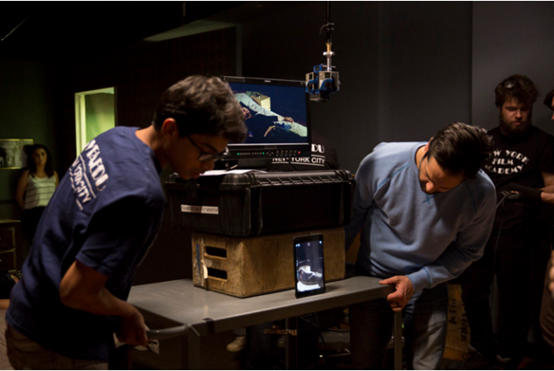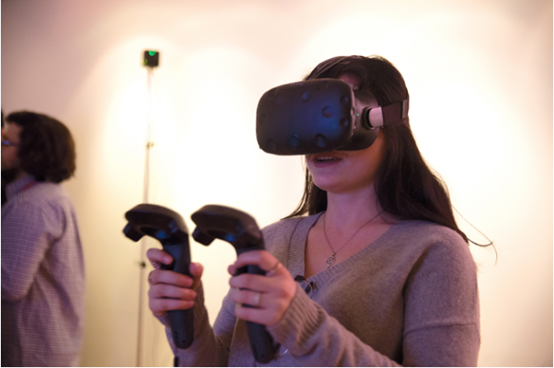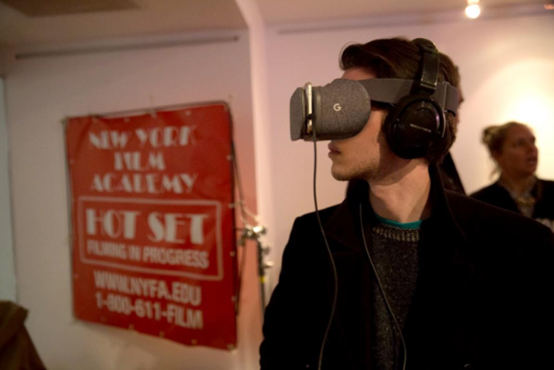Uncharted Territory: Q&A with NYFA’s Virtual Reality School on its Cutting Edge Workshops
Though today’s VR seems to fit snuggly into the gaming and entertainment categories, professionals, researchers, and investors in a broad spectrum of fields believe it will soon become a multi-billion dollar industry that crosses all platforms and areas of interest. To contribute to this nascent field, one needs to have a solid footing in digitaltechnologies coupled with a strong narrative voice and capacity to envision and create something from nothing.
If you think you might have what it takes to help build this brave new virtual infrastructure, you’ll need to find a spot to study all of its key components with leaders in the field who are equally as passionate about its future. Enter New York Film Academy’s Virtual Reality School. With two 8-week rapid-fire workshops in Narrative VR and VR Game Design offered at NYFA’s New York campus, students of game design, working professionals in related fields, or simply those with a curiosity can learn the concepts, design, and production of VR.
We’ve been itching to hear more about NYFA’s growing VR School and the additional programs it has in the works, so today we catch up with Co-Chairs Phoebe Elefante and Jonathan Whittaker. Elefante brings her broad background in writing, designing and producing animation and games to the table, while Whittaker’s accomplishments in live action and 3D production round out the co-chairs’ enviable resumes. We hope you enjoy!
ACR: Phoebe and Jonathan, thanks so much for taking time out of your busy day to speak with us about NYFA’s Virtual Reality workshops. Do you recall your first experience with VR?
FIND A SCHOOL
Phoebe Elefante: I recall my first experience in VR vividly. I didn’t really enjoy it- I got seriously sea-sick- but it was one of the most exciting and inspiring experiences of my life, creatively speaking. Coming from a background in screenwriting for games, I found the shift from flat screen to room-scale immersion a leap I had been wanting to take for a long time.
Jonathan Whittaker: I had “experienced” a few mobile 360 videos on my iPhone and found the freedom to look wherever interest dictated to be interesting and unique but it wasn’t until I tried out room-scale VR on the Vive that it really struck me that this was the future of communication and storytelling. It was the Martian VR Experience- it blew me away. The engagement of my visual cortex was so profound I truly felt as if I was there, in the airlock, about to embark on a journey to the unknown. The biggest takeaway was the sheer power of this new (to me) medium.

ACR: What was the genesis of the two 8-week VR workshops at NYFA, and how did you find yourselves at the helm of this trailblazing program?
PE: One of the instructors in our Game Design Conservatory brought in a DK1 Rift with the beginnings of a WIP VR game, and began introducing it to the students. As soon as I saw the demo, and saw the students’ reactions to the demo, I began lobbying my bosses for VR equipment. That was in the fall of 2015. Cut to February 2016, when the lines for VR experiences at the Tribeca Film Festival made industry news, and NYFA made the executive decision to explore VR with a couple of introductory workshops. I teamed up with Jonathan, Chair of Short-Term Filmmaking programs, and we launched the workshops. I didn’t even know I had a title until I saw the flyers for the first time!
JW: As Phoebe says, it was not like we were called into a meeting and handed the title of Co-Chairs, it really just happened organically because we were the only ones at the Academy evangelizing VR. The very first version of the 8-Week Narrative curriculum was structured to resemble what we have been doing for 20 some years in our Filmmaking Department and it didn’t take long to realize what a mistake that was- trying to force the language and grammar of filmmaking onto VR. We came to our current curriculum through the trial and error process that comes with any medium for which the rules have not yet been written.

ACR: Right. So when you’ve creating an entirely new curriculum for an entirely new technology, what considerations do you take into account?
PE: We knew that the technology was going to change continually, so we couldn’t design a program around the equipment. We focused on building a solid conceptual foundation since that’s the biggest challenge for most people, and teaching practical skills like coding in a game engine and stitching 360 video. NYFA’s approach to all programs is to reverse engineer the classes based on the portfolio of projects we want students to produce, and those portfolio requirements are derived from the current landscape of professionally-produced content.
JW: I concur with Phoebe here; one of the most important tenets of the program was to make sure we kept it hardware-agnostic. We focused on the conceptual, answering the fundamental questions of why this story needs to be told in VR and then how best to communicate it. That said, we of course teach a lot of hands-on tech classes because there needs to be actual outcomes (projects) that the students produce.
ACR: Is there an ideal student, by means of their prior experience, that the curriculum is designed to work best for?
JW: It sounds cliché but we really just wanted passionate storytellers with something to say. We needed people not afraid to fail; students who would be excited about entering a field where there are not yet formulas. We wanted trailblazers and adventurers. We originally attracted filmmakers but found that they had a hard time reconciling the fact they must cede control. When you spend your entire career (professional or academic) trying to perfect your understanding of the importance of the “frame” it’s really hard to then conceptualize the absence of the frame.
PE: We want everyone who wants to create in VR in the workshops! It’s an odd phenomenon- the rise of a new medium that people with relevant professional skills, and people with no related experience, are equally equipped to participate. Those with no experience are coming into it with no expectations and no assumptions, so they’re able to absorb the concepts without judgment and focus on the skill-building. For existing 3D artists, game developers, and filmmakers (and others with relevant professional experience), wrestling with the conceptual shift – going so far as to unlearn their own assumptions – becomes the focus of the workshop rather than technical execution.

ACR: Let’s talk about the practical FAQs. Are the current VR workshops full or part time?
PE: We currently offer two full-time 8 Week workshops. We have a range of different formats (from 1 Day Intro to 1 Year Conservatory) currently in the works.
JW: The current offerings are very intensive programs (about 20-30 hours of class time a wekk and at least another 10-20 hours of self-guided work). But as Phoebe says, we are working on expanding our portfolio of programs with the intent of reaching a wider audience. Not everyone can put their life on hold for two months.
ACR: Within that 8-week curriculum of the Narrative VR Workshop, is it tough balancing the time spent teaching the technical tools with the underlying storytelling concepts?
PE: It is incredibly tough to balance technical skills and storytelling concepts, but that’s been the approach of the New York Film Academy from its founding so it’s the way we think about education. It’s also the case that our students, and really everyone, instinctively understands at least a little something about storytelling. Whether you’re a good joke-teller, or you’ve got your “this is what I’m doing with my life, Grandma” speech down to a science, humanity is the storytelling species. What we’re teaching is vocabulary, formal techniques, and the conceptual shift from flat-screen to immersion. It’s plenty to cover, but in some ways we’re just drawing out the natural, unique voice of each student through her portfolio of projects.
JW: Not sure I can add much to Phoebe’s spot-on answer other than to agree. It is a challenge but it’s what we do in all of our programs at NYFA. We always preach that the technical aspects (cameras, camera support, computers, software, etc.) are just tools for the storyteller and this usually takes a few weeks for any student to grasp. It’s not until they feel comfortable simply operating the gear that they can start experimenting and figuring out that they can make creative choices as opposed to choices born of necessity.
ACR: Turning to the 8-week VR Game Design Workshop, students gain a broad understanding of VR within game design and ultimately produce a playable demo. Tell us a little about this workshop.
PE: Actually, students in the VR Game Design workshop produce 3 game demos! Two are alpha prototypes that experiment with the functionality of interactive VR and the capabilities of the Unity game engine. The third project is more refined and goes through at least two rounds of playtesting feedback before the end of the workshop. So, in addition to learning a bit of coding in C#, game dev in Unity, and immersive game design principles, students run through several iterations of a game development workflow, and apply player feedback to make their games better and more fun.
ACR: So this workshop can fill in missing links in a game designer’s portfolio?
PE: Anyone with prototype quality VR work in their portfolio has a huge advantage applying to jobs – and of course, game design and development skills are some of the most transferable and in-demand across industries. For further education, it’s a solid foundation of skills and will probably give students an idea of what role they’d want to play on a game team and what skills they’ll want to pursue to the point of mastery. It’s the rare Renaissance man or woman who can master the whole game dev pipeline.
ACR: That’s quite a leg up. Along with the new skills they learn, students get to work alongside professionals in the field. Talk to us a little about the leaders and innovators that you leverage at NYFA as instructors and guests.
PE: VR is a pretty small community right now, and everyone in that community just wants everyone else to drink the proverbial Kool-Aid so we’ve gotten access to people with some very impressive pedigrees who are anxious to pass on their skills and experience. Our biggest name-drops to date: Buzz Hays, VR OG & Lytro Cinema General Manager, Hugh McGrory, CEO of Datavized, Caitlin Burns, Vice Chair of the Producer’s Guild of America’s New Media Council, Bobby Alexis, former founder of Sprawly and now Director of Business Development, VR for Digital Domain…the list goes on and continues to grow.
JW: The support from the community has been encouraging to say the least. Everyone with whom we’ve had the pleasure of meeting and bringing in really seems to embrace the spirit of open source information. The only name I’ll add to Phoebe’s aforementioned is Chris Bobotis, Director of Immersive – Adobe Systems Inc & Founding Partner at Mettle, who so generously came in, demo’d some of what Mettle plugins have to offer, and answered the students’ questions.
ACR: Gaming and educationally-based VR uses seem to have stolen the show for now. From your perspective, what does the VR landscape look like in the coming decade in terms of industries beyond gaming that we all should be paying attention to?
JW: I think any field or industry that incorporates any form of training will find the tech to be a useful tool. It can and will be applied in such diverse fields- from sports to aviation. Commerce, especially web based, will be a big player in the world of VR very soon.
PE: I think entertainment applications for VR have garnered the most attention because when it comes right down to it, that’s what people care about. But it’s not true in either the funding picture or in content production. Medical and military applications (which have plenty of overlap) are really leading the field in numbers. But all that is going to be insignificant beside the emergence of WebVR- something our friends over at Datavized are actively developing, and the immediate utility of sharing practical information through Virtual and Augmented Reality. Imagine looking for your next apartment in VR, or teaching your grandchild how to play piano, or conducting a minor surgery thousands of miles from a hospital. We haven’t even imagined how VR and related technologies will change the way we communicate, learn, and play.
ACR: What are the practical limitations of VR at this moment, and are there workarounds from a design perspective to address them?
PE: Jesse Schell is a total rockstar in the world of game design and development, so I’ll take his word for it. The practical limitations that affect us are three-fold:
First, lack of expertise is universal so the instructors we hire are actively exploring this medium, and are learning more about teaching this subject with each run of the workshop. Personally, I believe in autodidactic learning environments, so that’s something I highlight as a major benefit to prospective students and future VR creators.
Second, without a clear path to an established career many would-be VR filmmakers and VR game developers are too wary to pursue their curiosity and excitement about this medium. And all I can say to that is: technological innovation and artistic creation are the two most uncertain passions to pursue. But if that’s your calling, get in at the beginning – that’s your best chance to make exactly what you want, and make a lasting impact on the medium and the world.
And third, there are those who claim that VR isn’t “new”, and while they are factually correct (development of this technology has been happening for decades), the promise of commercial saturation changes the conversation. It’s no longer about the tech – now it’s about shifting our conceptual and creative attention to the principles that matter most: presence, agency, interaction, and the exponential emotional impact of immersion…which leads us directly into an ethical debate about content, context, and application. That’s all about design thinking, and using audio-visual-tactile storytelling to ease the player’s transition into a new way of relating to their content.
JW: Agreed!
ACR: You mentioned earlier some new VR programs in the works at NYFA. Any chance of a full-fledged degree option soon?
PE: Yes! We are working on a One Year Immersive Design Conservatory, and a Two Year MFA in Immersive Design.
ACR: Wow. That is exciting stuff! Last but not least, are there any student ‘success stories’ you’d like to share?
PE: We’ve been incredibly impressed by the work the students have produced in the program. Several are in the midst of professional endeavors in the field. Three students from our first workshop – Catherine Henry, Jasmine Omidfar, and Russ Sharma – are producing VR content for retail and private clients under the shingle of Palpable Media. Another grad from our first workshop, Carlos Cruz has recently wrapped his production of Fordlând, a 360 VR documentary about the Ford Motor Company town abandoned in the Brazilian rainforest in 1934.
Many of the graduates from our second workshop run are actively developing projects they started within the course, including: Juan an arthouse music video by Filippo Bizzaglia, Undone a collaboration with social activist and poet Kayhan Irani by Ana Paula Loureiro Kler, Praying From Afar (Yao Yuan Qi Dao) the first Chinese-language 360 music video by Melody Liu, and Shu-Ying Chung is currently on the festival circuit with her film The Right Call. I know there are others, too!
ACR: Phoebe and Jonathan, the VR programs you’ve created at NYFA are truly cutting-edge. We very much look forward to watching them progress!
For more information about NYFA’s current line-up of Virtual Reality programs and workshops, please visit: https://www.nyfa.edu/vr/
Check out more interviews at The Animation Career Review Interview Series.
source: Bonnie Boglioli/animation career review

熱門頭條新聞
- Can CD Projekt Recapture the Magic?
- Meridiem announces physical edition of the paw-some Cats on Duty for PlayStation 5
- Chart a Course for Puzzle Adventure in Tile Tales: Pirate!
- Czech Game of the Year
- 2D-Survival Dead of Darkness launches for PC on 23rd January
- OFF is coming to Nintendo Switch and Steam in 2025!
- ARK: Ultimate Mobile Edition Available Now | New Trailer
- Farming Simulator Announces FarmCon 2025
